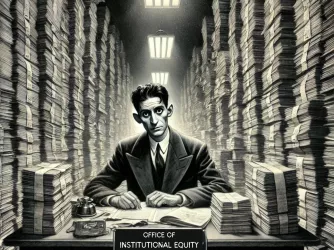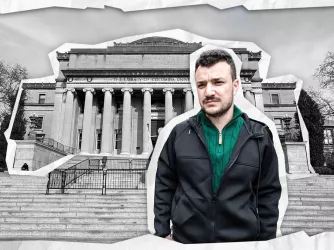Table of Contents
It’s Free Speech Week, and Students Are Speaking Out

October 21–27 is Free Speech Week, a celebration of Americans’ First Amendment right to free expression. You can celebrate by sharing information about constitutional rights with your friends, planning a free speech event, or even speaking your mind about the news of the day. Students especially should take this week to find out just how free speech is respected on their campuses and urge their classmates and administrators to make sure this fundamental right is fully protected.
In the spirit of Free Speech Week, American University (AU) student Sarah Harvard took to student newspaper The Eagle last Friday to do just that. Harvard conducted a survey of AU students that addressed their attitudes about free expression and the climate for free speech on AU’s campus. Unfortunately, she relayed some troubling results:
For those who identified as a political minority in the survey, 50 percent said they either rarely or never participate in class discussions because of the fear of being shut down or mocked for their opposing viewpoints. Along with this, 66 percent believed that restrictions of free speech in the classroom hinders the academic integrity of their curriculum. In the situations of free speech repression, 10 percent of students said they were restricted by professors, 25 percent said they were restricted by students and 30 percent said they felt restricted by both.
Harvard explains some of the dangers of an environment where students and faculty are punished for their speech or self-censor in order to avoid such punishment or retaliation:
If professors silence the voices of those who don’t agree with them, it eliminates the other side’s voice. Truth also withers when the administration puts professors into a situation of fear of repercussions for undergoing ground-breaking research or expressing their views on their specialization. Students will not have the ability to think critically about the lectures and readings of their courses due to the elimination and restriction on free speech in the classroom and academia.
Yesterday in The Brown Daily Herald, Brown University student Zach Ingber warned of a similar phenomenon endangering free and open discourse on campus. Brown’s mission statement declares a “spirit of free inquiry,” Ingber wrote, but he has seen both students and faculty stifle this spirit:
There have been horrifying instances of censorship, or attempted censorship, carried out by Brown students. Nothing typifies this idea more than the panel The Herald and the Taubman Center for Public Policy and American Institutions put together to discuss the then-impending same-sex marriage vote in the Rhode Island legislature. The organizations, doing what every respectable academic center or objective news institution should do, assembled a panel with opposing viewpoints which included a representative from the National Organization for Marriage, one of the United States’ preeminent advocacy groups for traditional marriage. The outrage from students was incredibly immature and inexcusable, with many students — who claim to be open-minded and liberal — advocating to remove the individual from the panel. One student, who thought he was so clever, even inquired as to the amount of the speaker’s honorarium so he could ask the University to deduct that amount from his tuition.
In the end, the panel member in question remained, but this incident stands as a clear example of how students are “unlearning liberty”—they are not just vulnerable to censorship by administrators; they are also, in some instances, attempting to silence each other. And, as Ingber points out, all students will suffer from a lack of vigorous debate:
John Stuart Mill argues that one of the chief arguments against censorship suggests that all viewpoints need to be heard because everyone should know how to respond to opposing opinions.
This is an important point, and one we at FIRE hope students, professors, and administrators keep in mind—especially this week!
Find more ways to celebrate on the Free Speech Week website, and read the rest of Ingber’s article in The Brown Daily Herald and Harvard’s piece in The Eagle.
Image: Speech bubble on wood - Shutterstock
Recent Articles
FIRE’s award-winning Newsdesk covers the free speech news you need to stay informed.

Navigating the Kafkaesque nightmare of Columbia's Office of Institutional Equity

A picture is worth a thousand words — unless a college district bans it

Intimidating abridgments and political stunts — First Amendment News 461
